八年级英语上册第一单元SectionA
Unit1SectionA课件人教版英语八年级上册(完整版)
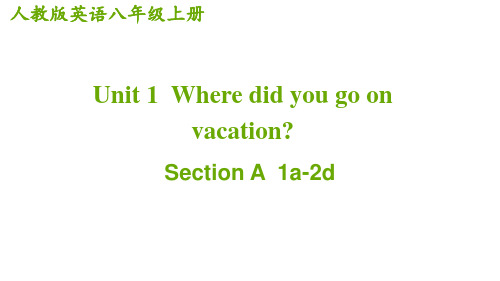
have
had
stay
stayed
eat
ate
do
did
study
studied
Let’s say
— Where did you go on
vacation?d其id后是的助行动为词动d词o用/do动e词s的原过形去。式,
— I…
e.g. Where did you read the obnoovka?cation “在度假;在休假”,是
vacation?
2b Listen again. Check (√) Yes, I did or No, I didn’t
for each question.
Did you…
go with anyone?
Grac go to Central Park?
e
buy anything
special?
Yes, I did.
1c Make conversations about the people in the picture.
Tin Xiang Hua a
Bob
To m
Sall y
A: Where did Tina go on vacation?
B: She went to the mountains.
RoleplaWWy hheerree ddiidd
_B_o_b_ ggoo oonn vvaaccaattiioonn??
HufH_i_nsee_hc/Sv_lienih_sg_eait._ne_dd_wh_.iesnt
Look and guess
1. Where is the girl? 2. What is she doing? 3. What’s that in her
八上英语Unit1_SectionA(2d-3c)

Rick:Wow! Did you see Huangguoshu Waterfall?
Helen: Yes,I did.It was wonderful! We took quite a few photos there. What about you? Did you do anything special last month?
• 2. —Jack, is there ____ in today’s newspaper?
• —No, nothing.
• A. anything important
B. something important
• C. important anything
D. important something
3.. —Did they clean the house yesterday afternoon?
— ____. They cleaned it this morning.
A. No, they don’t B. Yes, they did
C. No, they didn’t
D. Yes, they do
4.No one _______(know) to read such books.
A. know
B.knowing
C.knowed
D.knows
Summary
1.一般过去时的疑问句式:
Where did you go last month? Did you go with anyone? Did you see anything interesting? Did you buy anything? How was your vacation? 2.复合不定代词的用法
Unit1 SectionA(2d -3c)课件 人教版英语八年级上册
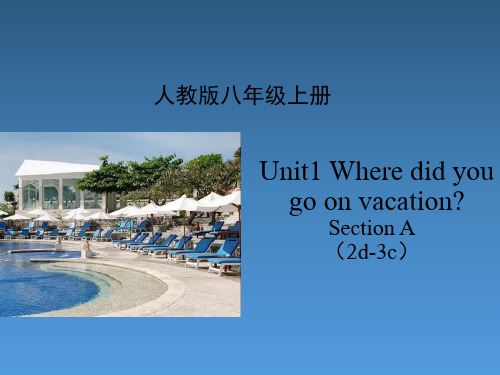
There’s __n_o_th_i_n_g__ _s_p_e_c_ia_l_ today.
4. 由some, any, no, every构成的复合不定 代词作主语时,都作单数看待,其谓 语动词用单数第三人称形式。
relax.
Words review
something nothing
everyone of course
myself yourself
hen pig seem bored someone diary
pron. 某事;某物 pron. 没有什么;没有一件东西 pron. 每人;人人;所有人 当然;自然 pron. 我自己;我本人 pron. 你自己;您自己 n. 母鸡 n. 猪 v. 好像;似乎;看来 adj. 厌倦的;烦闷的 pron. 某人 n. 日记;记事薄
my parents, but _n_o_th__in_g_ for myself. Linda: Why didn’t you buy _a_n_y_t_h_in_g__ for
yourself? Alice: I didn’t really see _a_n_y_t_h_in_g_ I liked.
人教版八年级上册
Unit1 Where did you go on vacation?
Section A (2d-3c)
1. 能掌握以下单词:most, something, nothing, everyone, myself, yourself, hen, pig, seem, bored, someone, diary. 2.能掌握以下句型: Where did you go on vacation ? I went to New York City. Did you go with anyone? No. No one was here. Everyone was vacation. 3.掌握一般过去时的定义,时间状语,谓语结构和句式变化。 4.掌握不定代词something , nothing, everyone, someone等的 用法。
人教版英语八年级上册Unit1SectionA(1a2d)说课稿

1.师生互动:
-教师通过提问引导学生思考,激发他们的学习兴趣。
-教师在学生回答问题时给予及时的反馈和指导,帮助他们改进语言表达。
2.生生互动:
-设计小组讨论活动,让学生在小组内分享自己的度假经历,并用英语进行描述。
-安排角色扮演活动,让学生模拟真实的交流场景,提高他们的口语表达能力。
(二)教学目标
1.知识与技能:
(1)学生能够听懂、会说、会读本节课所学的词汇和句型。
(2)学生能够运用过去时态描述过去度假的经历和地点。
(3)学生能够理解并运用本节课所学的语法知识,正确使用过去时态。
2.过程与方法:
(1)通过听力练习,培养学生获取和处理信息的能力。
(2)通过口语练习,提高学生的口语表达能力。
2.句型结构:在中间部分展示本节课的主要句型,下面辅以例句。
3.语法规则:在右侧详细列出过去时态的构成规则和注意事项。
板书在教学过程中的作用是提供视觉辅助,帮助学生理解和记忆。为确保板书清晰、简洁且有助于学生把握知识结构,我会:
-在课前精心规划板书内容,避免过度拥挤。
-使用大号字体和清晰的图表,确保远处学生也能看清楚。
2.电子白板:用于展示单词、句型和语法规则,方便学生跟随教师的讲解。
3.录音机或音响设备:播放听力材料,提高学生的听力理解能力。
4.互动式教学软件:通过软件进行练习和测试,及时反馈学生的学习情况。
这些媒体资源在教学中的作用是丰富教学内容,提高学生的学习兴趣,以及提供更加真实和多样的语言输入。
(三)互动方式
-在讲解过程中逐步展示板书内容,引导学生跟随教学节奏。
(二)教学反思
在教学过程中,我预见到以下可能出现的问题或挑战:
人教 八年级上册第一单元Section A 1a—2d(共49张PPT)
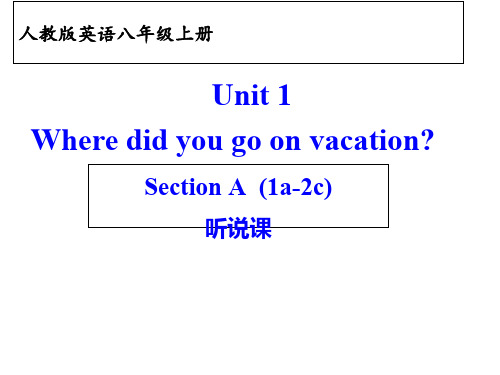
1. — Where did you go on vacation? — I went to the mountains. / …
2. Did you…? Yes, I did. / No, I didn’t.
Talk about past events.
my summer vacation
visited museums
visited my uncle
went to the mountains went to summer camp
Read aloud and remember them: went to New York City
went to the beach
visited museums stayed at home onversations
1、4 or 6 students in one group 2、Play the conversations in real situation 3、Practice for 4-6 mins 4、Show us in the front of the class
conversation1
A: Where did you go on vacation,Grace? B: I went to New York City. A: Oh, really? Did you go with anyone? B: Yes, I w__e_n_t_with my mother. A: Did you go to Central Park? B: Yes, I did . It was really nice. A: Did you buy an__y_th_in_g_s_p_e_c?ial B: Yes, I bought something for my father. A: Oh, really? What? B: _I_bo_u_gh_t_h_im a__hat.
Unit1SectionA(2d3c)课件人教版八年级英语上册

I have the most friends in my class. 在我班里,我的朋友最多。 He has the most milk. 他有最多的牛奶。
Grammar Focus
一般过去时
Where did you go on vacation? I went to New York City.
Unit 1
Where did you go on vacation?
Section A (2d-3c)
通过本节课的学习,同学们能够: 1.正确使用一般过去时,谈论假期中发生的事情; 2.通过练习和小组合作,能够掌握复合不定代词的用法。
Free talk
Where did you go on summer vacation?
Linda: Why didn’t you buy __a_n_y_th_i_n_g_ for yourself?
Alice: I didn’t really see _a_n_y_t_h_in_g__ I liked.
考点3:复合不定代词后面用to do作定语。 He wants something to eat now. 现在他想吃一些东西。 I have nothing to do in the evening. 晚上我无事可做。
考点4:some-开头的复合不定代词用于肯定句;any-开头
的复合不定代词用于否定句、疑问句或条件状语从句中。
How was the food?
Did everyone have a good time?
Everything tasted really good!
Oh, yes. Everything was excellent.
八年级上册英语第一单元课文
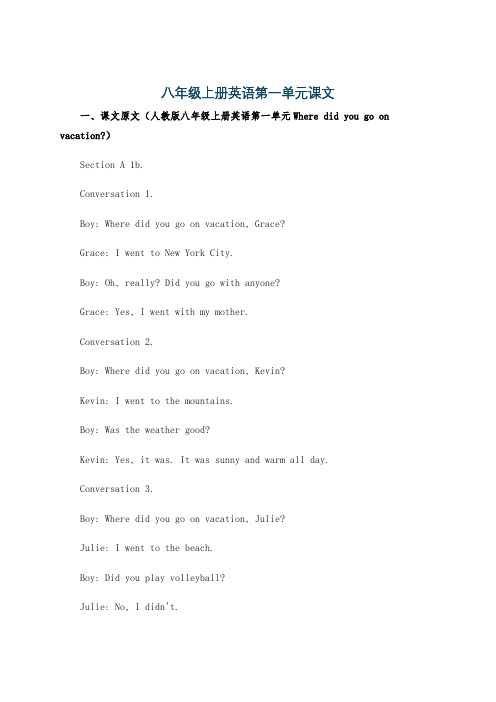
八年级上册英语第一单元课文一、课文原文(人教版八年级上册英语第一单元Where did you go on vacation?)Section A 1b.Conversation 1.Boy: Where did you go on vacation, Grace?Grace: I went to New York City.Boy: Oh, really? Did you go with anyone?Grace: Yes, I went with my mother.Conversation 2.Boy: Where did you go on vacation, Kevin?Kevin: I went to the mountains.Boy: Was the weather good?Kevin: Yes, it was. It was sunny and warm all day.Conversation 3.Boy: Where did you go on vacation, Julie?Julie: I went to the beach.Boy: Did you play volleyball?Julie: No, I didn't.2a & 2b.Rick: Hi, Helen. Long time no see.Helen: Hi, Rick. Yes, I was on vacation last month.Rick: Oh? Where did you go?Helen: I went to Guizhou with my family.Rick: Wow! Did you see Huangguoshu Waterfall?Helen: Yes, I did. It was wonderful! We took quite a few photos there. What about you? Did you do anything special last month?Rick: Not really. I just stayed at home most of the time to read and relax.Section B 2b.Jane: Hi, Bob. What did you do last weekend?Bob: I visited my uncle in the countryside.Jane: Sounds good. How was your trip?Bob: It was great. I had so much fun. I went fishing with my uncle, and we rode horses on the farm. I also milked a cow. It was really interesting.Jane: Wow! It seems that you had a wonderful time.Bob: Yeah. How about you? What did you do last weekend?Jane: I just stayed at home and did my homework.二、重点词汇与短语。
八上英语Unit1__SectionA__(1a-2d)
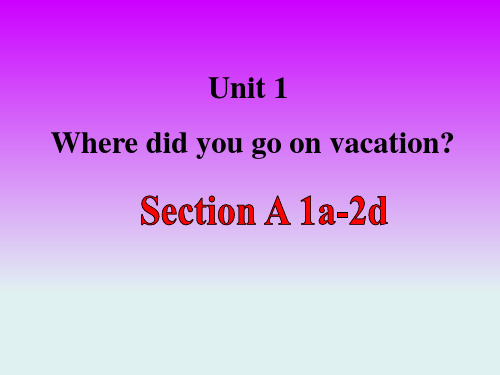
Where did he go on vacation? He went to the mountains.
Where did she go on vacation? She went to the beach.
Where did they go on vacation? They stayed at home.
Where did Xiang Hua go on vacation?
b He went to New York City.
Where did he go on vacation?
a He went to the beach.
Where did they go on vacation?
They visited their teacher.
1a Match the activities with the pictures
1. stayed at home f
2. went to New York City_b_ 3. visited my uncle_g__ 4. went to summer camp_d_ 5. went to the mountains c__ 6. went to the beach _a__ 7. Visited museums _e__
1b Listen and number the people in the
picture [1-5].
1. Tina
2. Xiang Hua
3. Sally 4. Bob 5. Tom
2 4
5 3
1c Make conversations about the people in 1a.
c
A: Where did Tina go on vacation? B: She went to the mountains.
- 1、下载文档前请自行甄别文档内容的完整性,平台不提供额外的编辑、内容补充、找答案等附加服务。
- 2、"仅部分预览"的文档,不可在线预览部分如存在完整性等问题,可反馈申请退款(可完整预览的文档不适用该条件!)。
- 3、如文档侵犯您的权益,请联系客服反馈,我们会尽快为您处理(人工客服工作时间:9:00-18:30)。
八年级上Unit1 Section A一、重点单词[in'dʒɔiəbl] adj. ___________________ 有乐趣的;令人愉快的[æk'tɪvəti] n.____________活动;活跃[dɪ'saɪd] v.____________决定;选定[traɪ] v.____________尝试;设法;努力['pærəɡlaɪdɪŋ] n.____________空中滑翔跳伞[bɜːd] n.____________鸟;禽['baɪsɪkl] n.____________自行车['bɪldɪŋ] n.____________建筑物['treɪdə(r)] n.____________商人;商船['wʌndə(r)] v.____________惊奇;想知道;怀疑['dɪfrəns] n.____________差异;不同[tɒp] n.____________顶部;顶[weɪt] v.____________等;等待[ʌm'brelə] n.____________伞;雨伞[wet] adj.____________湿的;雨天的[bɪ'ləʊ] prep.____________低于;在 ... 下面 adv.在下面;[ɪ'nʌf] adj.____________足够的 adv.足够地;充分地['hʌŋgri] adj.____________饥饿的;渴望的[əz] conj. ____________如同,像 ... 一样[hil]n.______________ 小山;山丘[dʌk] n.____________鸭肉;鸭[dɪs'laɪk] v.____________不喜欢;厌恶 n.不喜爱;厌恶;反感二、重点短语1.feel like给……的感觉;感受到2.on vacation 度假3.go to the beach 去沙滩4.go shopping 去买东西5. in the past 在过去6. walk around 四处走走7.too many太多(后接可数名词复数) too much太多(后接不可数名词) much too太(后接形容词)8.because of 因为 9.one bowl of ……一碗……10.the next day第二天 11. find out 找出,查明12. go on继续 13. take photos照相14. something important 重要的事 15.up and down 上上下下16.in excitement 兴奋地 e up 出来三、常考用法1.arrive in+方 arrive at +小地方到达某地2.decide to do sth决定去做某事3.try doing sth尝试做某事 try to do sth 尽力去做某事4.feel like doing sth. 想要做某事5.enjoy doing sth 喜欢做某事6.want to do sth 想去做某事7.start doing sth 开始做某事8.stop doing sth停止做某事9.look +形容词看起来……10.dislike doing sth 不喜欢做某事11.why not do sth? = Why don’t you do sth? 为什么不做……呢?12.so+形容词+that+从句如此……以至于……13.tell sb (not)to do sth告诉某人(不要)做某事14.keep doing sth 继续做某事15.forget to do sth忘记去做某事 forget doing sth 忘记做过某事四、重点语法——一般过去时1.一般过去时的基本用法表示过去发生的动作或存在的状态We went to the beach and swam in the sea yesterday.表示过去的习惯动作或过去经常发生、反复发生的动作或存在的状态。
My father always walked to the school last year.2.动词过去式变化规则:①直接加ed:watched talked②以不发音的字母e结尾的动词直接加d:liked lived③以辅音字母y结尾的动词,y变成i再加ed:studied如果y前面是元音,则直接加ed:stayed④以重读闭音节结尾的,且词尾只有一个辅音字母(辅元辅),双写再加ed:stopped 写出以下动词的过去式look- play- hope- live- stop- plan- worry- carry- bring- buy- come- do- drink- eat- feed- go- have- hide-【练习】1.The funny story _________ me laugh.A.makeB. madeC. letD. to let2.She ________ very happy when she heard the good news.A. feelB. feelsC. feltD. feeled3. He decided _________ to Hainan for his holidayA. flyB. fliesC. to flyD. flew4. They had great fun _________ in the water.A. playB. playsC. playingD. playful5. The movie was so _________ that we all liked it.A. excitingB. excitedC. boringD. bored6. What did Lisa ________ about her vacation?A. talkB. sayC. tellD. speak7. She _______ in Shanghai this morning with her parents.A. got toB. reachedC. arrivedD. got8. -I usually go there by taxi.- Why not ________ by bus for a change.A.to try goingB. trying to goC. to try and goD. try doing9.I felt like I __________.A.swimB. swimmingC. to swimD. was swimming10.We couldn’t see anything ________ the heavy foggy weather.A.soB. becauseC. because ofD. whyBCCCA BCDDC五、讲解1.What activities do you find enjoyable?activity为可数名词,意为“活动”。
例如:What activities do you want to take after school?【拓展】其形容词形式为active :积极的。
常考短语:be active in 在某方面积极例如:My sister is very active in the campaign protecting Our Earth.【练习】We can have many _________ after class in our school, so most of us are very _______ in taking them.A.activity; activeB. active ; activityC. activities; activeD. active ; activities2.It was sunny and hot, so we decided to go to the beach near out hotel.动词decide意为“决定”,常考短语:decide to do sth.决定做某事 decide not to do sth. 决定不做某事3.My sister and I tried paragliding.try在此为动词,意为:试图;设法;努力尝试【练习】- I didn’t hear you come in just now.-That’s good. We tried _______ any noise, for you were sleeping.A.not makeB. not to makeC. to makeD. making4.I feel like I was a bird.feel like :给……的感觉像;感受到。
其中like为介词,意为“像”。
例句:What’s this in my pocket? It feels like a nut. 什么东西在我口袋里?感觉像是坚果。
【拓展】feel like 还有“想要……”的意思。
常考用法:feel like doing sth. 相当于want /would like to do sth. 表示想要做某事。
如:I don’t feel like drinking beer.= I don’t want to drink beer. 我不想喝啤酒。
5.I wonder what life was like here in the past. 我想知道这里过去的生活是什么样子。
wonder 用作动词,意为:想知道,相当于want to know.I wondered if you like her.我想知道你是否喜欢她。
I wonder why Ann is late. 我想知道安为什么迟到了。
【拓展】wonder的用法①后接that 引导的宾语从句,表示“对……感到惊讶”,that常常可以省去。
I wonder (that) she has won the race. 我对他赢了比赛感到惊讶。
②后接“疑问词+不定式”构成的短语I’m just wondering how to do it. 我正想知道该怎样做那件事。
③后接if或whether引导的宾语从句,常用来表达一种委婉的请求或疑问。
She wondered whether you were free that morning. 她想知道你那天上午是否有空。
